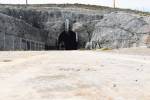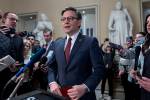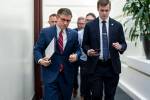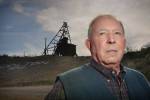GOP, Reid headed for more conflict over Yucca, nuclear waste
WASHINGTON -- A new Republican majority in the House is poised to assert itself on nuclear waste matters in the upcoming Congress, with newly re-elected Sen. Harry Reid of Nevada set to guard again that the Yucca Mountain repository plan is not revived.
President Barack Obama with strong direction from Reid, the Senate majority leader, shut down the Nevada program once envisioned for burying 77,000 tons of highly radioactive used nuclear fuel and waste materials into the Nye County ridge, 100 miles northwest of Las Vegas.
A blue ribbon commission that Obama established to study alternatives is expected to release a draft report next summer, with a final version due early in 2012.
But there still is a twitch in the Yucca corpse. Two years ago the Department of Energy under President George W. Bush sought permission from government nuclear safety regulators to build out the Nevada site. Despite the change in White House leadership and policy, that application remains alive for now, if only on paper.
A variety of state leaders, congressional officials, energy consultants, environmental advocates and industry lobbyists said the ultimate fate of the Yucca program might be decided in the courts.
But in the meantime, they said, a stage is being set for low-grade conflict over the two years of the next congressional session, with a possible window for change opening when the blue ribbon commission issues its recommendations.
By the 2012 elections, the Nevada repository plan could be doornail-dead and long gone if a new nuclear waste management strategy emerges and gains consensus, or it could be poised for an attempted resurrection if one does not.
Bruce Breslow, director of Nevada's Agency for Nuclear Projects, said the state needs to remain vigilant.
"I would think that now the election is over, the Republican-controlled House will continue pushing to fund the Yucca program," Breslow said. "While Nevada's delegation opposes Yucca Mountain, we don't have more than 10 friends in the House, and no other states want high-level nuclear waste, so I would think those states will continue to push.
"Where Nevada's strength lies is in the Senate, and I think there will be a Yucca war of some sort," Breslow said.
For his part, Reid flatly says Yucca Mountain is dead on Capitol Hill, and will remain so.
"The Republicans have been very clear that they want to turn Nevada into the nation's nuclear dumping ground," a spokesman said. "Senator Reid, as the majority leader of the U.S. Senate, will never let that happen. The dump is dead. Period."
"The best news of election night was Senator Reid's re-election," said longtime Yucca Mountain opponent Kevin Kamps, radioactive waste specialist for Beyond Nuclear, an anti-nuclear advocacy group.
The Senate leader "is able to block funding and he is certainly able to block legislation from moving to the Senate floor, and that is good news for the next two years at least," Kamps said.
"The one thing I worry about is that through the simple expenditure of several billion dollars that whole (Yucca Mountain) program could be put back in place," Kamps added.
With Reid in control, the Senate is expected to remain largely silent on nuclear waste as it awaits the recommendations of the Blue Ribbon Commission on America's Nuclear Future.
In the House, Republicans who captured the majority on Election Day have yet to pick committee leaders for the next Congress, including chairmen for the Energy and Appropriations committees with jurisdiction over nuclear waste policy and spending. It is in those venues, as well as the House Oversight and Government Reform Committee, where the issue could emerge.
Rep. Rodney Frelinghuysen, R-N.J., who has been critical of the Obama administration's handling of nuclear waste management, is poised to take over the energy and water spending subcommittee. The House Energy and Commerce Committee could be headed by either Rep. Joe Barton of Texas or Rep. Fred Upton of Michigan, both of whom have been repository proponents.
No matter who heads the committees, there is an expectation that Republicans will convene nuclear waste hearings by the spring, including critical looks at how the Obama administration shut down the Yucca program over the protests of elected Republicans and some Democrats.
Quizzed about that during trips to Capitol Hill this year, Energy Secretary Steven Chu said the Obama administration had the authority to close doors on the repository, but some lawmakers maintain otherwise.
"The goal is if they can embarrass the president on nuclear waste management, they will try to do so," energy consultant and former Energy Department official Lake Barrett said of the new House majority.
The Nuclear Energy Institute, the government affairs arm of the nuclear industry, plans to sit on the sidelines until the blue ribbon commission releases its initial findings, probably in May, according to Alex Flint, the institute's senior vice president of government affairs.
"There are some members (of Congress) who will want to move faster ... but when it comes to acting and moving on legislation, in the end we have always seen used fuel legislation as bipartisan and having broad support," Flint said. "This Congress may be one that addresses this issue quite substantively but we simply have to wait."
Barrett, who was deputy director for the Yucca Mountain program from 1993 to 2002, said Republicans might try to set aside $50 million or so and direct the Nuclear Regulatory Commission to proceed with license hearings on the repository, even as the site itself remains shuttered.
Flint said the nuclear industry wants to know the outcome of 20 years of repository studies in Nevada, for which ratepayers contributed more than $8 billion.
"Huge amounts of industry money have been spent on this program and we want to know the results, if not for this program going forward then for other programs going forward," Flint said. "It is a valuable data-set and we would like to see resolution of this issue."
At the end, the nuclear safety agency could judge the Nevada site unsafe. If the site were judged to be safe, Barrett said, "The nation has a policy call to make. Does the nation want to build Yucca Mountain or does the nation want to go on a new path?"
Either way, Barrett said, the blue ribbon panel could present an opportunity for a fresh start on nuclear waste disposal, if not in Nevada, then someplace else.
The commissioners seem to be leaning to recommending that a federal corporation with less red tape and more access to funding should be put in charge of finding and building a waste site, Barrett said.
Also, he said, they seem to recognize the government's conflicts with Nevada over two decades have gotten nowhere, and a more collaborative relationship will be necessary if a repository host can be found.
"Clearly first you have to find a site," Barrett said. "Then you need to have a better relationship with the host. It needs to be fairer, with better benefits. There needs to be jobs, and participation in a more meaningful way with the state."
Contact Stephens Washington Bureau Chief Steve Tetreault at stetreault@stephensmedia.com or 202-783-1760.























